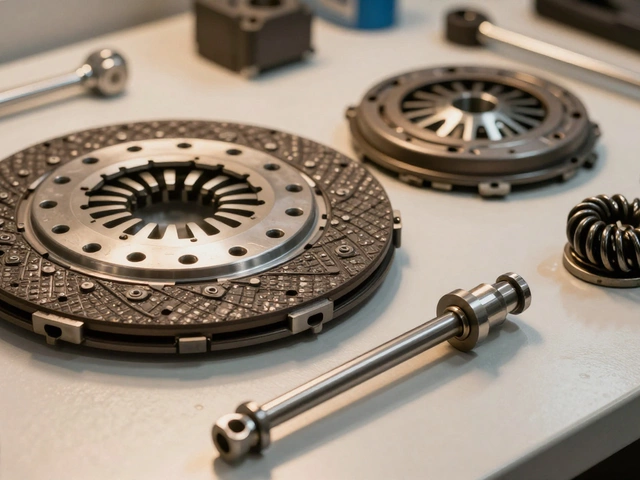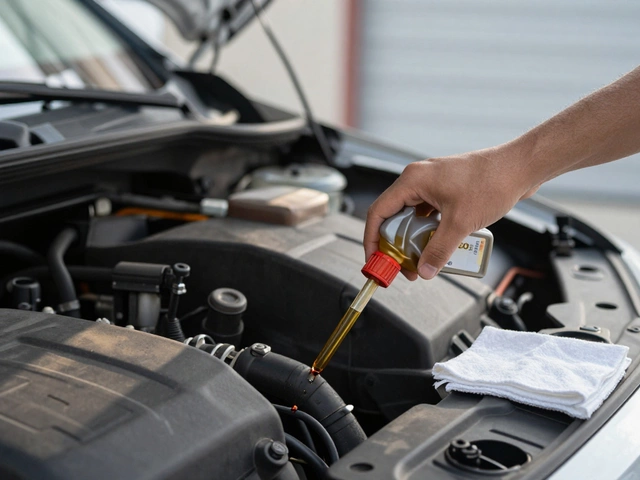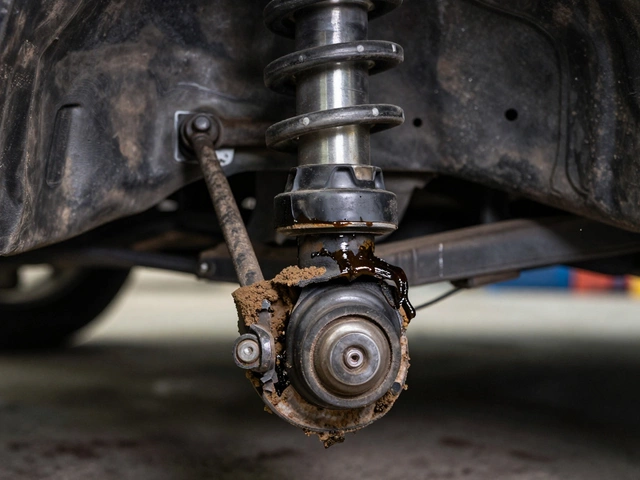
Changing your vehicle's engine oil might seem like a mundane task, yet it's a facet of car maintenance that should never be overlooked. It's easy to push it down the priority list, especially when life's demands get in the way. But understanding why timely oil changes are crucial can save you heartache and expense in the long run.
Your vehicle's engine is a complex marvel, with numerous moving parts working in synchrony. Engine oil plays a vital role in keeping everything lubricated, reducing friction and wear. Without it, or with deteriorated oil, the components start to grind and overheat. Delaying an oil change can turn into more than just a wallet-draining affair — it can impact the life of your engine.
- Importance of Regular Oil Changes
- Consequences of Delaying an Oil Change
- Understanding Engine Oil Functions
- Identifying Warning Signs
- Tips for Effective Oil Maintenance
- The Future of Engine Oils
Importance of Regular Oil Changes
When it comes to car maintenance, regular oil changes should be at the top of every vehicle owner's list. The role engine oil plays in maintaining your car's health is akin to blood in the human body—it's essential, irreplaceable, and, when neglected, invites an array of complications. One of the fundamental benefits of regular oil changes is lubrication. Oil reduces friction among the numerous moving parts in an engine, ensuring they interact seamlessly without unnecessary wear or overheating. Threadbare or old oil, in contrast, loses its viscosity, becoming less effective at its job and leaving the engine susceptible to damage. Additionally, fresh oil plays a crucial part in cleaning the engine. Over time, oil picks up dirt, debris, and combustion by-products. Consistent changes prevent the accumulation of sludge, which can significantly hamper engine efficiency.
Beyond the evident mechanical advantages, regular oil changes are vital for fuel efficiency. An engine running on high-quality, clean oil is more optimized for performance, reducing fuel consumption. Recent studies indicate a marked difference in miles per gallon between cars with regular oil maintenance and those with sporadic attention to oil changes. Moreover, while security also plays a role, it is economically sensible. The cost of an occasional oil change pales in comparison to the expenses incurred by engine repairs or replacements due to oil neglect. It's fascinating that some might view this maintenance as an inconvenience and not realize the potential repercussions of waiting too long before addressing it.
The importance of this simple maintenance task is highlighted by industry experts.
"Skipping oil changes can dramatically affect engine wear and increase the risk of engine failure," remarks John Nielsen, a senior director at the American Automobile Association (AAA). Oil changes, while seemingly trivial, could very well be the determining factor between a thriving engine and one on the brink of breakdown. Adding a regular schedule to your calendar is an investment in your vehicle's longevity and health.The statistics speak for themselves. Vehicle owners who adhere to scheduled maintenance, including routine oil changes, experience almost 65% fewer engine issues than those who neglect such practices. Tables such as these have convinced many car enthusiasts and laypeople alike of the long-term benefits. As the understanding of engine oil technology advances, it is hoped more will come to appreciate its centrality in ongoing car care.
Consequences of Delaying an Oil Change
Deciding to delay an oil change can usher in a multitude of issues, each one potentially more costly and damaging than the last. Think of engine oil as the lifeblood of your vehicle; it lubricates, cools, and cleans the engine parts, ensuring smooth operation. When oil starts to degrade over time due to heat and contaminants, it loses its ability to provide these critical functions, resulting in increased wear and tear on engine components. This wear can lead to significant engine damage if not addressed promptly. In severe cases, parts such as pistons and bearings may fail, leading to an expensive repair or complete engine replacement.
One of the most immediate consequences of neglected oil changes is decreased engine performance. The longer the oil sits unchanged, the more it becomes thick and sludgy. This hinders its flow throughout the engine, sabotaging fuel efficiency and reducing power. Consequently, you may find yourself at the petrol station more often and feel a noticeable drop in acceleration. Poor lubrication also escalates friction between moving parts, generating more heat. This heat buildup can warp engine parts, causing a ripple effect that further decreases efficiency and reliability.
Neglecting a timely oil change carries more than just technical drawbacks; it also affects your vehicle's emissions. Dirty oil leads to more pollutants being released into the environment as your engine burns excess fuel in an attempt to operate effectively. An overlooked oil change can even trigger the check engine light, a small warning sign of larger mechanical issues brewing within. Responding promptly to this light can mean the difference between a minor and major repair. According to studies, vehicles running on aged oil display increased emissions by up to 15%, illustrating the environmental impact of neglected maintenance.
Perhaps the most overlooked issue linked with deferred oil changes is the threat it poses to the warranty of your vehicle. Many warranties require regular oil changes to remain valid, making it crucial to adhere to the manufacturer’s recommended schedule. Keeping accurate maintenance records, especially those concerning oil changes, can save you money and stress in the long run. Without these, you might face hefty repair bills that could have been avoided. The inconvenience of a breakdown in the middle of nowhere can't be overstated; time-consuming roadside assistance is rarely on anyone’s agenda.
"Regular oil changes are an essential preventative measure for a vehicle's long-term health," says an expert at the British Motor Museum. "They are a lot cheaper than engine replacements or extensive repairs."
Lastly, a hidden cost of postponing an oil change is the impact on your car’s resale value. Buyers are increasingly savvy, often requesting maintenance histories before purchasing. Missing records or signs of neglected maintenance can deter potential buyers or significantly decrease the resale price. Given the choice between a diligently maintained car and a neglected one, prudent buyers will opt for the former, making regular, documented oil changes a sound investment not only in engine health but also in the financial valuation of your vehicle.

Understanding Engine Oil Functions
For many, the concept of engine oil might seem straightforward: pour it in, make sure it stays at the right level, and change it when the time comes. However, there's much more to this seemingly simple liquid. Engine oil is essentially the lifeblood of your vehicle, performing several vital roles to keep your car running smoothly. At its core, engine oil serves as a lubricant, reducing friction between the moving parts of the engine. This friction can lead to wear and tear, which the oil helps to minimize.
Alongside lubrication, engine oil acts as a cleaner. Over time, engines accumulate dirt, debris, and by-products from combustion, which can settle and create blockages. The oil picks up these particles, preventing them from hindering engine performance. Complementing this cleaning role, engine oil also has the job of protecting the engine against corrosion. By coating the engine's parts, it serves as a barrier against moisture and other corrosive elements that could lead to rust and degradation.
Another key function of engine oil is heat dispersion. As your engine operates, it generates a significant amount of heat. The oil helps to absorb some of this heat and disperse it, preventing overheating and maintaining a stable operating temperature. This is crucial for the engine's efficiency and longevity. Interestingly, engine oil also seals tiny gaps between the engine's components, enhancing efficiency by improving compression within the engine's cylinders.
"Engine oil is the unsung hero of car maintenance, quietly ensuring that the heart of your car keeps on beating," says noted automotive engineer Peter Arcadia. "Without it, engines would barely survive for a minute."
It's important to note that engine oil isn't a one-size-fits-all solution. It's available in various viscosities and grades, each designed for different types of engines and driving conditions. Selecting the right oil involves consulting your vehicle's manual and considering factors like the climate where you drive. Some oils are specially formulated for high-performance engines, offering additives that can enhance protection and performance under extreme conditions. Others are better suited for older engines, designed to accommodate increased wear and the types of build-up more common in such cases.
Finally, in today's environmentally conscious world, some manufacturers are focusing on developing more sustainable engine oils. From recycled base oils to formulas designed to extend the life of an engine oil change interval, these innovations are paving the way for an eco-friendlier approach to automotive maintenance. In essence, understanding the myriad functions of engine oil not only bolsters your knowledge as a car owner but arms you with the information needed to make smarter maintenance decisions for your vehicle.
Identifying Warning Signs
Being able to identify the warning signs that your vehicle is overdue for an oil change can be the difference between a simple maintenance task and a major repair bill. Many drivers might not be aware of the subtle hints their cars give them, but paying attention to these details can save you from future headaches. A common sign is a visible change in the oil color. Fresh oil is usually amber, but over time, it becomes darker as it collects dirt and debris. A quick check under the hood with the dipstick can reveal if the oil resembles used coffee. If it does, it's time for a change.
Another indicator is the level of oil in your car. Low oil levels can cause your engine to work harder than usual, which can be disastrous over time. Regularly monitoring your oil level with the dipstick can be a lifesaver, literally and figuratively. If the level is below the minimum mark, it’s a red flag that you should attend to immediately. Your car might also be trying to communicate through its performance. An engine that sounds noisier than usual, particularly with ticking or knocking noises, might be crying for fresh oil.
In the words of automotive expert Mike Allen, "Ignoring oil changes leads to all sorts of sludge and deposits that clog up your engine, doing real damage over time."
Sometimes, your car will be more direct and activate the oil change or check engine light, a clear sign you shouldn’t ignore. Besides, keep an eye on your mileage readings. Most manufacturers suggest an oil change every 3,000 to 5,000 miles, though synthetic oils might last longer. Feeling unusual vibrations or a change in oil smell inside the vehicle are lesser-known indicators that something might be amiss. Knowledge about these signs and acting on them can enhance your vehicle's health and your driving experience.

Tips for Effective Oil Maintenance
Maintaining your vehicle's engine oil isn't just about regular changes; it's about understanding and optimizing every aspect involved in the oil's lifecycle within your engine. Regular oil checks can help catch issues early. A golden rule is to check your oil level once a month. Pull out the dipstick and wipe it clean before dipping it again. If the oil level is below the minimum mark, it’s a clear indicator that a top-up is needed. However, be careful about overfilling, as too much oil can be just as harmful as too little.
Choosing the right type of oil for your vehicle and climate is another vital point. Synthetic oils have become more popular due to their ability to perform better under temperature extremes, offering protection whether you're starting your car in freezing conditions or dealing with the height of summer heat. Using the right oil viscosity is crucial. In colder climates, you might consider a 5W-30, while a warmer climate might call for a 10W-40. Understanding these requirements not only ensures efficient engine operation but also prolongs the engine’s life.
Speaking of oil types, don't overlook the opportunities offered by car maintenance apps. There are several apps available that can help remind you when an oil change is due, based on either mileage or time since the last change. These digital nudges ensure you don’t miss crucial maintenance tasks. Creating an oil change log can offer additional insights. Track the brand and type of oil used, any issues noticed after the change, and how the vehicle health seems post-service. This information can guide your choices in the future.
Oil Filters and Their Role
Many drivers forget that oil filters play a critical function. An oil filter keeps the oil clean, and replacing it at each oil change is crucial. A clogged filter won't stop debris from contaminating your engine, reducing its efficiency. Make it a habit to inspect the filter at each change. Considering the entire lubrication system, including the filter, is key to effective maintenance, not just focusing on fresh oil.For those interested in a more technical approach, some car enthusiasts suggest taking oil samples and sending them to labs for analysis. This advanced step can provide detailed insights into your engine's internal status. By analyzing trace metals, you can predict wear within engine parts, helping you address small issues before they develop into significant problems, possibly saving on higher repair costs later. Though often reserved for high-performance or specialty vehicles, anyone can benefit from this thorough oil examination.
It's enlightening to examine the data surrounding vehicle maintenance and oil changes. As per a study from the Car Care Council, over 20% of vehicles have either low or contaminated oil, suggesting a widespread issue with routine car care. Exploring such stats can motivate you never to ignore the signs of stressed oil, ensuring longevity and reduced operating costs for your beloved car. By incorporating these tips into your regular maintenance rituals, you’re not just protecting your car’s engine — you're enhancing its long-term reliability.
The Future of Engine Oils
The realm of engine oil is undergoing a fascinating transformation, mainly driven by advances in technology and the automotive industry's unwavering move towards sustainability. As we stand on the cusp of an era where electric vehicles are steadily gaining traction, traditional oil change norms are facing a significant shift. Yet, internal combustion engines are far from obsolete, and the journey of innovation in engine lubricants continues unabated.
The future promises remarkable breakthroughs in oil formulations designed to cater not only to efficiency but also to ecological consciousness. For instance, initiatives to create biodegradable and plant-based engine oils are underway, opening new avenues for green-dependent motorists. Manufacturers are increasingly focusing on low-viscosity oils that cater to engines' needs to provide enhanced fuel efficiency while minimizing emissions and friction. By doing so, they are also extending the longevity of critical components, thus echoing the need for fewer oil changes which directly implies lesser waste production.
Concurrently, integration of smart technology into automobiles is paving the path for intelligent car maintenance. Vehicles are becoming adept at monitoring their engine oil health autonomously and even predicting future maintenance needs, a testament to advanced sensor tech. This may soon lead to cars alerting drivers about the perfect timing for oil changes, based on usage patterns and real-time diagnostics. Such systems aren't just a feat of technical genius, but they embody an era where predictive maintenance becomes the cornerstone of vehicle care.
In the backdrop of these technological shifts, regulatory bodies worldwide are playing a robust role in setting stringent guidelines around emissions, inherently pushing oil manufacturers to redefine their products' characteristics. The research points toward oils adept at handling higher temperatures and pressures prevalent in modern high-performance engines, furnishing them with properties that ensure stable viscosity indices and continue operating efficiently even under duress. Vehicle health therefore remains a priority, rooted in the very chemistry of better-performing engine oils.
According to Jane Wilson, Senior Analyst at Automotive Futures, "The quest for sustainable advancement is as much about curiosity-driven science as it is about aligning with global climate goals. Engine oils, once thought of as mundane, are becoming engineered masterpieces of sustainable innovation."
As a part of reshaping the future, the automotive industry is expected to witness the rise of synthetic oils more prevalently. The key to their appeal lies in tailor-made molecules meeting specific engine requirements unlike mineral oils, their synthetic counterparts often guarantee fewer impurities, superior shear strength, and better economy, translating into palpable gains in vehicle performance. Prospects also involve oils that actively reduce engine wear by embedding nano-additives offering something akin to a bionic boost.
The future of engine oils paints a canvas of innovations destined not only to uphold engine integrity but to potentially redefine what car maintenance encompasses. As synthetic blends and eco-friendly formulations rise to the fore, the dependency on traditional oil change protocols will eventually rethink its footing. This promises a future where vehicles are not just modes of transport, but intelligent, sustainable companions ushering us into a greener tomorrow.





